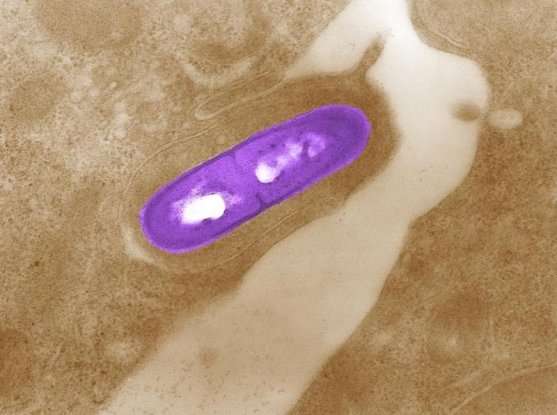
Listeria monocytogenes. Credit: CDC PHIL
A machine learning-based algorithm could predict the potential of peptides as immune activators.
A team of New England-based researchers have developed a deep neural network-based algorithm dubbed BOTA (Bacteria Originated T cell Antigen) that can predict—based on a bacterial genome data—the peptides with the best chance to trigger an immune response.
The researchers hail from the Broad Institute’s Infectious Disease and Microbiome program, the Massachusetts General Hospital’s Center for the Study of Inflammatory Bowel Disease and Center for Computational and Integrative biology, and the Massachusetts Institute of Technology’s Center for Microbiome Informatics and Therapeutics.
In the immune system, T cells are kept under control by regulating precisely when they are able to respond to a pathogen. For example, helper T cells will only turn on if other immune cells—like antigen-presenting cells (APCs)—present bacterial peptides on their surface in a protein complex called MHC class II.
Not every bacterial peptide is immunodominant—where they get loaded into MHC II and present to T cells. In addition, not every peptide bound to the complex antigenic is capable of provoking an immune response.
How these systems operate is not yet full known, making efforts to better understand the relationship between humans as hosts, the pathogens that can infect the body and microbiomes, difficult to achieve.
However, BOTA is built and trained to recognize potential antigens by running a “peptidomic” study of MHC II, collecting and characterizing every MHC II-bound peptide natively found in APCs in mice. The system then formulates a list of features underlying immunodominance and antigenicity.
“Identifying immunodominant T cell epitopes remains a significant challenge in the context of infectious disease, autoimmunity, and immuno-oncology,” the authors write. “To address the challenge of antigen discovery, we developed a quantitative proteomic approach that enabled unbiased identification of major histocompatibility complex class II (MHCII)–associated peptide epitopes and biochemical features of antigenicity.”
BOTA was then benchmarked with two of mouse models—Listeria monocytogenes infection and colitis—to assess its predictions using a high-throughput, single-cell RNA-sequencing screening test that measure whether T cells could see predicted peptides and how strongly they reacted.
The new algorithm was able to accurately predict which bacterial peptides bound to MCH II in both models. The researchers also found that the RNA-sequencing data helped to identify the peptides that sparked the strongest T cell responses in the Listeria model.
“Collectively, these studies provide a framework for defining the immunodominance landscape across a broad range of immune pathologies,” the study states.
The results suggest that the new system could ultimately help researchers in a number of ways, including discovering previously unknown bacterial antigens, improving vaccine designs and illuminating how the microbiome tunes the immune system to understand how that tuning breaks down in inflammatory conditions.
The study was published in Nature Medicine.




